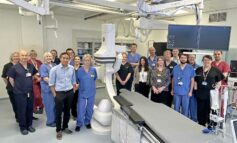Women across Bath not to be embarrassed about cancer screening, after it was revealed that nine women in the UK are diagnosed with cervical cancer and three women will lose their lives to the disease every day.

Cervical cancer is the most common cancer in women under 35 but is largely preventable thanks to cervical screening and the HPV vaccination programme.
But, statistics show that the number of women aged 25-29 years of age being screened for cervical cancer is the lowest in any age group and numbers attending for screening are falling year on year.
Surveys undertaken by cancer charities indicate embarrassment and a lack of understanding of the causes of cervical cancer may be behind the fall in numbers attending.
The number of women dying from cervical cancer has halved over the past 28 years as a result of the NHS screening programme as well as improvement in treatment.
Despite this success over 5,000 women are diagnosed with cervical cancer each year. The majority of women diagnosed with cervical cancer have delayed coming forward for screening which has impacted on their ability to have early changes treated.
Consultant in Public Health and Screening and Immunisation Lead (Bath, Gloucestershire, Swindon and Wiltshire) for NHS England, Dr Ardiana Gjini said: “There has been a fall in attendance of women across all age groups over the past few years but this decline is most marked amongst younger women.”
Making time to take up your screening appointment is the single most important active step you can take to avoid developing cervical cancer.
NHS England and Public Health England are supporting Cervical Screening Awareness Week which runs from 12th – 18th June. The week aims to raise awareness of the importance of cervical screening and its role in preventing cancer, as well as encouraging women to go for their screening test when invited.
Dr Ardiana Gjini added: “It is really important for young women to understand the importance of attending cervical screening when they receive a letter from their GP as it can detect pre-cancer abnormalities, which, if left untreated, may develop into cancer. Screening is for people without symptoms as a preventative measure.
“The screening test is relatively simple, takes about five minutes and is performed by the Practice Nurse at your GP Surgery. Ninety-five per cent of results will be normal and of those that are not, the vast majority can be treated very easily and will never develop in to cancer.
“I urge women who may have received a letter and decided not to attend to reconsider and make an appointment – it really is very quick, it could prevent you needing more invasive treatment later on and could ultimately save your life.”
NHS England’s Screening and Immunisation teams work with GP practices to increase awareness and are supporting Cervical Screening Awareness Week.



